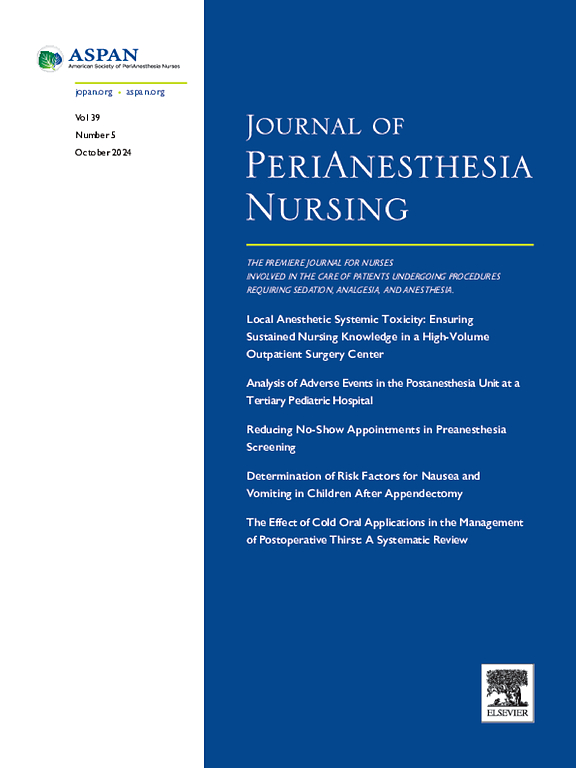Effectiveness of Slow-stroke Back and Hot Stone Massage Therapy on Postoperative Anxiety Management in Orthopedic Patients: A Randomized Clinical Trial Study
IF 2
4区 医学
Q2 NURSING
引用次数: 0
Abstract
Purpose
Surgery is a stressful experience for patients, and most surgical patients have some degree of anxiety. Postoperative anxiety management of patients as a nursing intervention and care can be effective in improving the patient’s outcome and preventing postoperative complications.
Design
A randomized controlled trial.
Methods
Ninety-nine patients were randomly assigned to slow-stroke back or hot stone massage therapy and routine care group after orthopedic surgery from 2023 to 2024. On the first or second day after the surgery, participants in the intervention groups received slow-stroke back or hot stone massage therapy 2 times in the morning and afternoon for 10 to 15 minutes. At the baseline and 30 minutes after the intervention, the anxiety (Spielberger Anxiety Inventory) of patients was measured.
Findings
Slow-stroke back or hot stone massage therapy significantly decreased patient anxiety compared with the routine care group (P < .001) and also before the intervention (P < .001).
Conclusions
This study suggests that massage therapy in the form of slow-stroke back or with hot stone can be an effective complementary and alternative care in alleviating postoperative anxiety.
慢中风背部和热石按摩疗法对骨科患者术后焦虑管理的有效性:一项随机临床试验研究。
目的:手术对患者来说是一种有压力的经历,大多数手术患者都有一定程度的焦虑。将患者术后焦虑管理作为一种护理干预和护理,可有效改善患者预后和预防术后并发症。设计:随机对照试验。方法:2023 ~ 2024年,将99例骨科术后患者随机分为慢中风背部或热石按摩治疗组和常规护理组。干预组于术后第1天或第2天接受慢中风背部或热石按摩治疗,早晚各2次,每次10 ~ 15分钟。在基线和干预后30分钟,测量患者的焦虑(Spielberger焦虑量表)。结果:与常规护理组相比,慢中风背部或热石按摩治疗可显著降低患者焦虑(P)。结论:本研究提示,慢中风背部或热石按摩治疗可作为缓解术后焦虑的有效补充和替代护理。
本文章由计算机程序翻译,如有差异,请以英文原文为准。
求助全文
约1分钟内获得全文
求助全文
来源期刊

Journal of Perianesthesia Nursing
NURSING-
CiteScore
2.20
自引率
17.60%
发文量
279
审稿时长
90 days
期刊介绍:
The Journal of PeriAnesthesia Nursing provides original, peer-reviewed research for a primary audience that includes nurses in perianesthesia settings, including ambulatory surgery, preadmission testing, postanesthesia care (Phases I and II), extended observation, and pain management. The Journal provides a forum for sharing professional knowledge and experience relating to management, ethics, legislation, research, and other aspects of perianesthesia nursing.
 求助内容:
求助内容: 应助结果提醒方式:
应助结果提醒方式:


